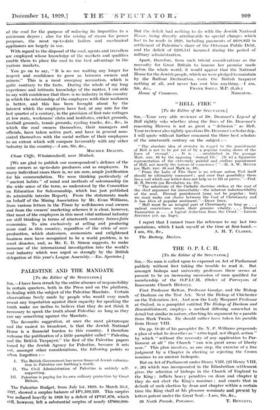THE 0. P. I. C. H.
[To the Editor of the SPECTATOR.] SIR,—NO man is called upon to expound an Act of Parliament publicly without first taking the trouble to read it. But
amongst bishops and university professors there seems at present to be an increasing succession of men qualified for membership of the O.P.I.C.H. (Order of Purveyors of Inaccurate Church History).
First Professor Helton, Professor Goudge, and the Bishop of Durham on the Test Act. Next the Bishop of Chichester on the Toleration Act. And now the Lady Margaret Professor
at Oxford, in a pamphlet entitled The Bishop of Durham and Disestablishment, employs a method differing somewhat in detail but similar in nature, clinching his argument by a parable from Mark Twain. He should rather have taken his parable from Henry VIII.
On pp. 18-20 of his pamphlet Dr. N. P. Williams propounds
a plan of what he describes as extra-legal, not illegal, action " by which " without the necessity of any application to Par- liament at all " the Church " can win great areas of liberty now." This plan involves, as one step, the exercise of a free judgment by a Chapter in electing or rejecting the Crown nominee to an ancient bishopric.
But an Act of Parliament under Henry VIII. (25 Henry VIII. c. 20) which was incorporated in the Elizabethan settlement gives the selection of bishops in the Church of England to the King ; inflicts heavy penalties on dean and chapter if they do not elect the King's nominee ; and enacts that in default of such election by dean and chapter within a certain time the King shall at his pleasure nominate and present by letters patent under the Great Seal.—I am, Sir, &c., 26 North Parade, Penzance. T. BENNETT.












































 Previous page
Previous page